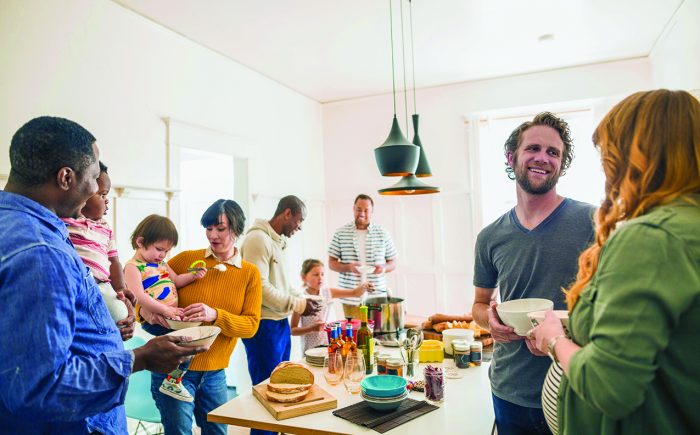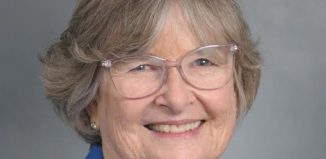COVID-19 concerns heighten as new variant is discovered

Despite the desire to relax, remove masks and go on with life, the pandemic, even prior to the emergence of a new, mutation-laden variant, has become a central concern among government and health care officials.
The stock market has felt the effects of concerns over the Omicron variant, hospitals are sending off some positive tests to check for the new variant, and the federal government is restricting travel from several countries in Africa.
While health care officials anticipate the inevitable presence of confirmed cases of Omicron in the United States and New York, they had already seen an increase in confirmed cases and had increased the need for treatment.
At St. Catherine of Siena Hospital in Smithtown, the hospital provided monoclonal antibody treatment for 32 people the Tuesday before Thanksgiving, according to St. Catherine Chief Medical Officer Dr. Mickel Khlat. That is up from an average of four to five a day just a few weeks earlier.
That increase comes not only from a rise in group activities indoors, but also from a reduction in the immunity conferred by vaccines that are less effective after six months.
Six weeks ago, unvaccinated patients represented 80% of those who received monoclonal antibody treatments, said Dr. Khlat. Recently, the percentage of vaccinated people who receive antibody treatment has risen to 50%.
“If you got the vaccine six or seven or eight months ago, your immunity is waning,” said Dr. Khlat.
Dr. Gregson Pigott explained that monoclonal antibody treatment could be lifesaving.
“The key is to seek treatment soon after a COVID diagnosis,” Dr. Pigott explained in an email.
The percentage of positive tests in Suffolk County has been rising at a rapid pace, mirroring the positive tests for the nation. The percentage of positive tests on a seven-day average reported on Tuesday, Nov. 29, was 5.3%. That is up from a seven-day average of 3.7% just two weeks earlier and 2.4% a month earlier, according to data from the Suffolk County Department of Health.
Dr. Susan Donelan, medical director of the Healthcare Epidemiology Department at Stony Brook Medicine, explained that this is likely a result of variable acceptance of vaccination opportunities, inconsistent or poor mask usage compliance, increased indoor activity, initiation of indoor heating and general pandemic fatigue.
At the same time, hospitals on Long Island and around the state are preparing and monitoring for the potential arrival of the Omicron variant, which the World Health Organization recently deemed a variant of concern in part because of the number of mutations to the spike protein. These mutations could alter the dynamic in the Stéphane Bancel indicated that vaccines may not be as effective against this variant.
Pigott suggested that too little is known to determine how effective the current vaccines would be against the new variant.
“We will learn more from the World Health Organization and the [Centers for Disease Control and Prevention] in the weeks to come,” Pigott explained in an email.
Dr. Adrian Popp, chair of Infection Control at Huntington Hospital/Northwell Health, said numerous mutations don’t necessarily mean this variant is any worse.
“It’s important to see what is the effect of these mutations,” Popp explained in an email. The answers to whether the strain is more virulent or if the vaccines are less effective are still unknown. The next few weeks could provide a clearer picture, Popp said.
Doctors urged residents to become vaccinated and, if eligible, get the booster.
“My message to the public is to still get the vaccine,” said Khlat. “I wouldn’t tell people to wait” until companies like Pfizer, Johnson & Johnson and Moderna develop vaccines or boosters for the latest variant. COVID is a “killer. I want everyone vaccinated as soon as possible.”
At the same time, hospitals are actively monitoring positive cases for the potential spread of the Omicron variant into the area.
Since the emergence of the new variant on Nov. 26, “Stony Brook’s labs have been hard at work in pursuit of an answer” to whether any patients have contracted the variant, Donelan explained in an email.
Stony Brook routinely sends 10 random samples of positive COVID swabs each week to the Wadsworth Virology lab for genomic sequencing. The hospital epidemiologist reviews the available electronic medical record of all positives to identify any patient who may have key characteristics, such as traveling in areas in which Omicron is more prevalent.
“Our lab is working directly with Wadsworth to facilitate rapid sequencing of any samples with high suspicion,” Donelan added.
Scientists are also trying to determine whether this variant has different symptoms and outcomes from the original virus.
The mRNA platforms from Pfizer and Moderna have the ability to pivot rapidly in the manufacturing process in response to changes in the genetic sequences of the virus.
Thanksgiving and holiday effects
With families coming together over Thanksgiving, health care professionals anticipate that the number of cases will rise.
“Thanksgiving gatherings, historically, have provided an annual springboard for cross-transmission of all sorts of respiratory viruses,” Donelan wrote. “This year shouldn’t be expected to be different.”
Pigott added that he would anticipate that the number of positive cases
would rise.
As for travel during the December holidays, Pigott advises people to practice prevention strategies that include washing their hands frequently, wearing masks in public indoor settings, keeping their distance as much as possible in public and when people don’t know the vaccination status of others.
Khlat suggested that people didn’t necessarily need to cancel any holiday travel plans because of the new variant. He urged people to “be smart” and make sure they wear masks on airplanes and remain aware of their surroundings.
“We can’t be prisoners,” he said. He also recommended that people stay home if they have symptoms like sniffles or a cough.
Khlat, who is planning to travel in January, will bring along hand sanitizer and may wear an n95 mask.






